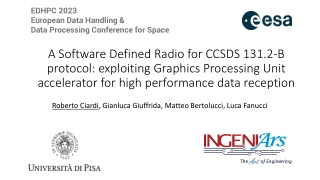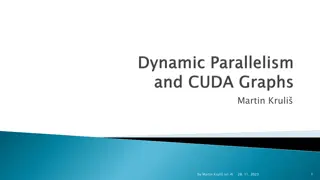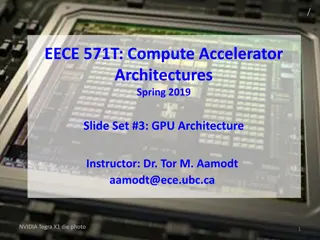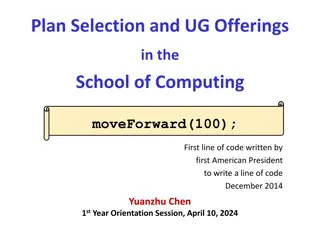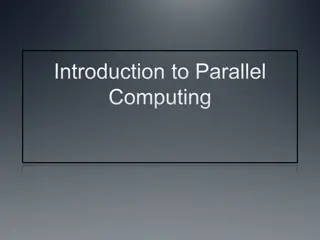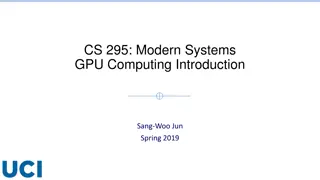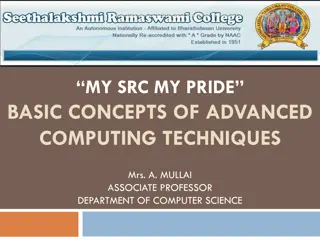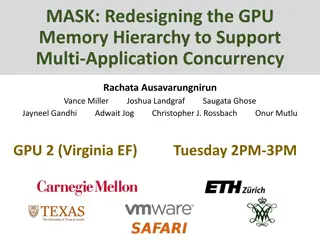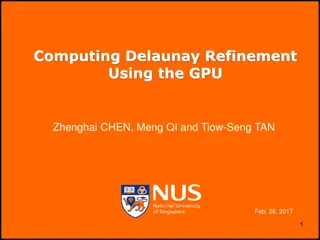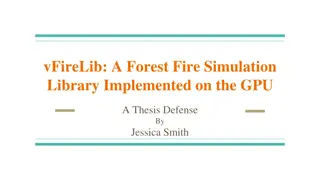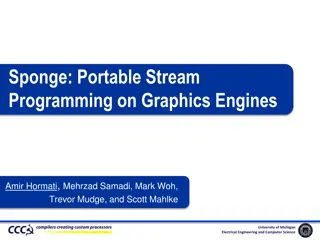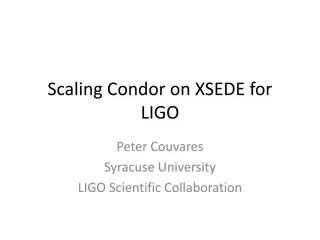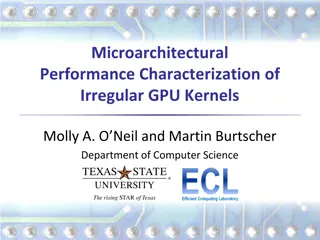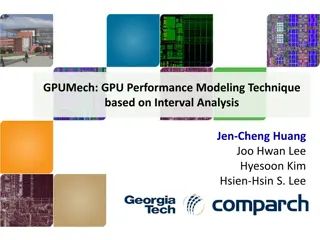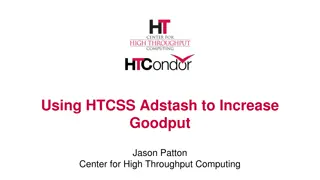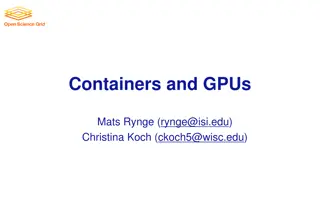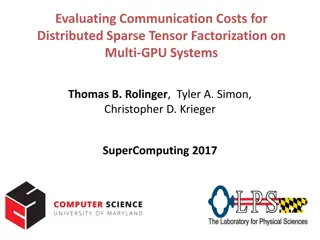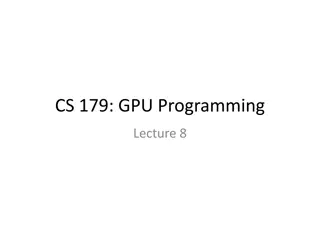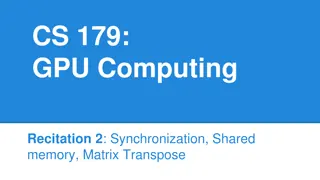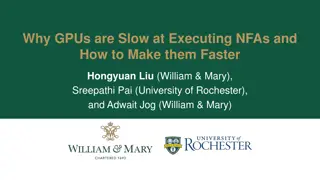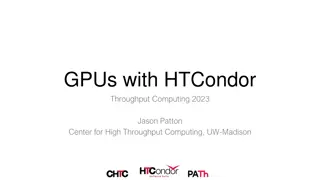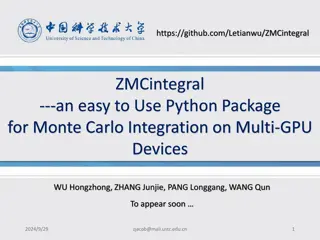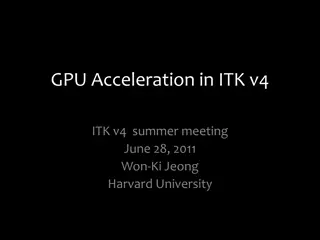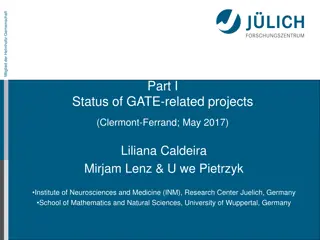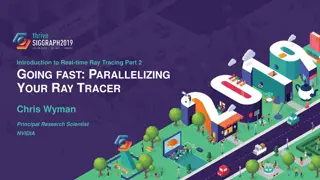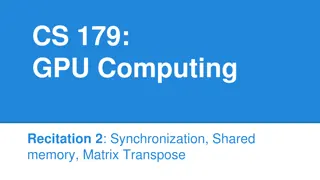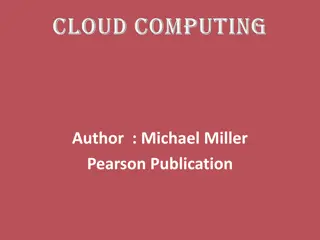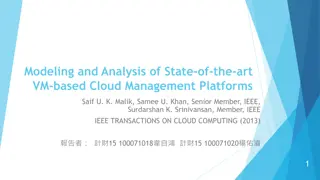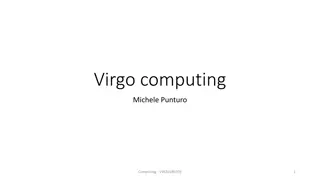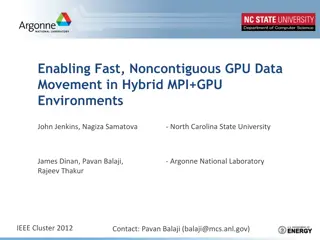Enhancing Data Reception Performance with GPU Acceleration in CCSDS 131.2-B Protocol
Explore the utilization of Graphics Processing Unit (GPU) accelerators for high-performance data reception in a Software Defined Radio (SDR) system following the CCSDS 131.2-B protocol. The research, presented at the EDHPC 2023 Conference, focuses on implementing a state-of-the-art GP-GPU receiver t
0 views • 33 slides
Understanding Parallelism in GPU Computing by Martin Kruli
This content delves into different types of parallelism in GPU computing, such as task parallelism and data parallelism, along with discussing unsuitable problems for GPUs and providing solutions like iterative kernel execution and mapping irregular structures to regular grids. The article also touc
1 views • 39 slides
Overview of GPU Architecture and Memory Systems in NVIDIA Tegra X1
Dive into the intricacies of GPU architecture and memory systems with a detailed exploration of the NVIDIA Tegra X1 die photo, instruction fetching mechanisms, SIMT core organization, cache lockup problems, and efficient memory management techniques highlighted in the provided educational materials.
7 views • 62 slides
Computing Degree Plans and Offerings at School of Computing
Explore the diverse degree plans and offerings at the School of Computing, including Honours and General degrees, minors, and certificates in Data Analytics. Plan selection is crucial for advancing to second-year courses, with automatic acceptance and pending list options available. Discover the var
0 views • 20 slides
Exploring Parallel Computing: Concepts and Applications
Dive into the world of parallel computing with an engaging analogy of picking apples, relating different types of parallelism. Learn about task and data decomposition, software models, hardware architectures, and challenges in utilizing parallelism. Discover the potential of completing multiple part
0 views • 27 slides
Understanding Parallel and Distributed Computing Systems
In parallel computing, processing elements collaborate to solve problems, while distributed systems appear as a single coherent system to users, made up of independent computers. Contemporary computing systems like mobile devices, IoT devices, and high-end gaming computers incorporate parallel and d
1 views • 11 slides
Parallel Implementation of Multivariate Empirical Mode Decomposition on GPU
Empirical Mode Decomposition (EMD) is a signal processing technique used for separating different oscillation modes in a time series signal. This paper explores the parallel implementation of Multivariate Empirical Mode Decomposition (MEMD) on GPU, discussing numerical steps, implementation details,
1 views • 15 slides
GPU Scheduling Strategies: Maximizing Performance with Cache-Conscious Wavefront Scheduling
Explore GPU scheduling strategies including Loose Round Robin (LRR) for maximizing performance by efficiently managing warps, Cache-Conscious Wavefront Scheduling for improved cache utilization, and Greedy-then-oldest (GTO) scheduling to enhance cache locality. Learn how these techniques optimize GP
0 views • 21 slides
Understanding Modern GPU Computing: A Historical Overview
Delve into the fascinating history of Graphic Processing Units (GPUs), from the era of CPU-dominated graphics computation to the introduction of 3D accelerator cards, and the evolution of GPU architectures like NVIDIA Volta-based GV100. Explore the peak performance comparison between CPUs and GPUs,
5 views • 20 slides
Exploring Basic Concepts of Advanced Computing Techniques
Delve into the world of advanced computing techniques with Mrs. A. Mullai as she discusses networks, computing, and pervasive (ubiquitous) computing. Discover how networks facilitate data exchange, the role of computing in designing hardware and software systems, and the trend of embedding computati
2 views • 40 slides
Understanding Cloud Computing, Edge Computing, and Their Applications
Cloud computing entails centralized processing of data on powerful servers, offering scalable resources over the internet. Edge computing brings processing closer to data generation points, reducing latency and enhancing security. Both paradigms cater to different needs such as IoT, autonomous vehic
0 views • 18 slides
Redesigning the GPU Memory Hierarchy for Multi-Application Concurrency
This presentation delves into the innovative reimagining of GPU memory hierarchy to accommodate multiple applications concurrently. It explores the challenges of GPU sharing with address translation, high-latency page walks, and inefficient caching, offering insights into a translation-aware memory
1 views • 15 slides
GPU-Accelerated Delaunay Refinement: Efficient Triangulation Algorithm
This study presents a novel approach for computing Delaunay refinement using GPU acceleration. The algorithm aims to generate a constrained Delaunay triangulation from a planar straight line graph efficiently, with improvements in termination handling and Steiner point management. By leveraging GPU
0 views • 23 slides
Exploring Orto-Computing: Bridging the Gap Between Formal and Phenomenological Computing
Meaningful experiments suggest a transition from the formal, Turing-based approach to a structural-phenomenological one called Orto-Computing. This innovative concept integrates mind-matter interaction and non-formal functions within computational systems, offering potential solutions to complexity
0 views • 18 slides
vFireLib: Forest Fire Simulation Library on GPU
Dive into Jessica Smith's thesis defense on vFireLib, a forest fire simulation library implemented on the GPU. The research focuses on real-time GPU-based wildfire simulation for effective and safe wildfire suppression efforts, aiming to reduce costs and mitigate loss of habitat, property, and life.
0 views • 95 slides
Understanding GPU Programming Models and Execution Architecture
Explore the world of GPU programming with insights into GPU architecture, programming models, and execution models. Discover the evolution of GPUs and their importance in graphics engines and high-performance computing, as discussed by experts from the University of Michigan.
0 views • 28 slides
Scaling Condor on XSEDE for LIGO - Collaborative Computing Project
The project aims to evaluate the utilization of XSEDE resources by LIGO for large-scale computing tasks, with a focus on distributed computing challenges and fostering a research computing community. Various aspects such as political, cultural, and technical narratives surrounding the collaboration
0 views • 28 slides
Microarchitectural Performance Characterization of Irregular GPU Kernels
GPUs are widely used for high-performance computing, but irregular algorithms pose challenges for parallelization. This study delves into the microarchitectural aspects affecting GPU performance, emphasizing best practices to optimize irregular GPU kernels. The impact of branch divergence, memory co
0 views • 26 slides
Advanced GPU Performance Modeling Techniques
Explore cutting-edge techniques in GPU performance modeling, including interval analysis, resource contention identification, detailed timing simulation, and balancing accuracy with efficiency. Learn how to leverage both functional simulation and analytical modeling to pinpoint performance bottlenec
0 views • 32 slides
Overview of the Computing Community Consortium
The Computing Community Consortium (CCC) was established in 2006 under the Computing Research Association (CRA) to develop a vision for computing research and communicate it to stakeholders. It aims to align computing research with national priorities, encourage high-impact research, and groom new l
0 views • 48 slides
Enhancing Goodput with HTCSS and Adstash in High Throughput Computing
Explore how utilizing HTCSS and Adstash can boost goodput in high throughput computing environments. Learn about usage reporting with accounting ads, storing job history in Elasticsearch, and common challenges to overcome. Discover insights on CPU core hours delivery, GPU usage, memory analytics, us
0 views • 27 slides
Introduction to Mobile Computing Principles and Designing Mobile Applications
Mobile computing systems involve computing capabilities that can be utilized while on the move, leveraging wireless connectivity, small size, and mobile-specific functionalities. The history of mobile computing traces back to military origins and has evolved with technologies like GPS and wireless t
0 views • 98 slides
Understanding Containers and GPUs for Efficient Computing
Discover the power of Graphical Processing Units (GPUs) and how they can be harnessed through containers for parallelized workloads in tasks such as deep learning, molecular dynamics, and number crunching. Learn about GPU use cases, managing GPU jobs, requesting GPUs, and the benefits of using conta
0 views • 21 slides
Introduction to Boston University's Shared Computing Cluster
Boston University's Shared Computing Cluster (SCC) provides researchers with access to a high-performance computing environment for running code, collaborating on shared data, and utilizing specialized software packages. With over 800 nodes, 20,000 processors, and hundreds of GPUs, the SCC offers re
0 views • 63 slides
Communication Costs in Distributed Sparse Tensor Factorization on Multi-GPU Systems
This research paper presented an evaluation of communication costs for distributed sparse tensor factorization on multi-GPU systems. It discussed the background of tensors, tensor factorization methods like CP-ALS, and communication requirements in RefacTo. The motivation highlighted the dominance o
0 views • 34 slides
Overview of Task Computing in Parallel and Distributed Systems
Task computing in parallel and distributed systems involves organizing applications into a collection of tasks that can be executed in a remote environment. Tasks are individual units of code that produce output files and may require input files for execution. Middleware operations coordinate task e
0 views • 17 slides
GPU Acceleration in ITK v4 Overview
This presentation by Won-Ki Jeong from Harvard University at the ITK v4 winter meeting in 2011 discusses the implementation and advantages of GPU acceleration in ITK v4. Topics covered include the use of GPUs as co-processors for massively parallel processing, memory and process management, new GPU
0 views • 33 slides
Understanding GPU-Accelerated Fast Fourier Transform
Today's lecture delves into the realm of GPU-accelerated Fast Fourier Transform (cuFFT), exploring the frequency content present in signals, Discrete Fourier Transform (DFT) formulations, roots of unity, and an alternative approach for DFT calculation. The lecture showcases the efficiency of GPU-bas
0 views • 40 slides
GPU Computing and Synchronization Techniques
Synchronization in GPU computing is crucial for managing shared resources and coordinating parallel tasks efficiently. Techniques such as __syncthreads() and atomic instructions help ensure data integrity and avoid race conditions in parallel algorithms. Examples requiring synchronization include Pa
0 views • 22 slides
Understanding GPU Performance for NFA Processing
Hongyuan Liu, Sreepathi Pai, and Adwait Jog delve into the challenges of GPU performance when executing NFAs. They address data movement and utilization issues, proposing solutions and discussing the efficiency of processing large-scale NFAs on GPUs. The research explores architectures and paralleli
0 views • 25 slides
Maximizing GPU Throughput with HTCondor in 2023
Explore the integration of GPUs with HTCondor for efficient throughput computing in 2023. Learn how to enable GPUs on execution platforms, request GPUs for jobs, and configure job environments. Discover key considerations for jobs with specific GPU requirements and how to allocate GPUs effectively.
0 views • 22 slides
ZMCintegral: Python Package for Monte Carlo Integration on Multi-GPU Devices
ZMCintegral is an easy-to-use Python package designed for Monte Carlo integration on multi-GPU devices. It offers features such as random sampling within a domain, adaptive importance sampling using methods like Vegas, and leveraging TensorFlow-GPU backend for efficient computation. The package prov
0 views • 7 slides
GPU Acceleration in ITK v4: Overview and Implementation
This presentation discusses the implementation of GPU acceleration in ITK v4, focusing on providing a high-level GPU abstraction, transparent resource management, code development status, and GPU core classes. Goals include speeding up certain types of problems and managing memory effectively.
0 views • 32 slides
Improvements and Performance Analysis of GATE Simulation on HPC Cluster
This report covers the status of GATE-related projects presented in May 2017 by Liliana Caldeira, Mirjam Lenz, and U. we Pietrzyk at the Helmholtz-Gemeinschaft. It focuses on running GATE on a high-performance computing (HPC) cluster, particularly on the JURECA supercomputer at the Juelich Supercomp
0 views • 8 slides
Efficient Parallelization Techniques for GPU Ray Tracing
Dive into the world of real-time ray tracing with part 2 of this series, focusing on parallelizing your ray tracer for optimal performance. Explore the essentials needed before GPU ray tracing, handle materials, textures, and mesh files efficiently, and understand the complexities of rendering trian
0 views • 159 slides
Synchronization and Shared Memory in GPU Computing
Synchronization and shared memory play vital roles in optimizing parallelism in GPU computing. __syncthreads() enables thread synchronization within blocks, while atomic instructions ensure serialized access to shared resources. Examples like Parallel BFS and summing numbers highlight the need for s
0 views • 21 slides
Introduction to Cloud Computing: A Comprehensive Overview
Cloud computing, a transformative technology, enables easy access to applications and data from anywhere in the world, promoting collaboration and efficiency. This chapter delves into the fundamentals of cloud computing, distinguishing it from traditional desktop computing and network computing. Und
0 views • 32 slides
State-of-the-art Analysis of VM-based Cloud Management Platforms
This study delves into the modeling and analysis of cutting-edge VM-based cloud management platforms, exploring topics such as cloud computing, cloud structure, types of cloud computing, key features of cloud computing, and examples from the cloud computing industry. It discusses Infrastructure as a
0 views • 40 slides
Overview of Virgo Computing Activities
Virgo computing has been a hot topic recently, with various discussions and meetings focusing on computing issues, future developments in astroparticle computing, and funding for INFN experiments. The activities include presentations, committee meetings, talks, and challenges in computing faced by V
0 views • 34 slides
Fast Noncontiguous GPU Data Movement in Hybrid MPI+GPU Environments
This research focuses on enabling efficient and fast noncontiguous data movement between GPUs in hybrid MPI+GPU environments. The study explores techniques such as MPI-derived data types to facilitate noncontiguous message passing and improve communication performance in GPU-accelerated systems. By
0 views • 18 slides
